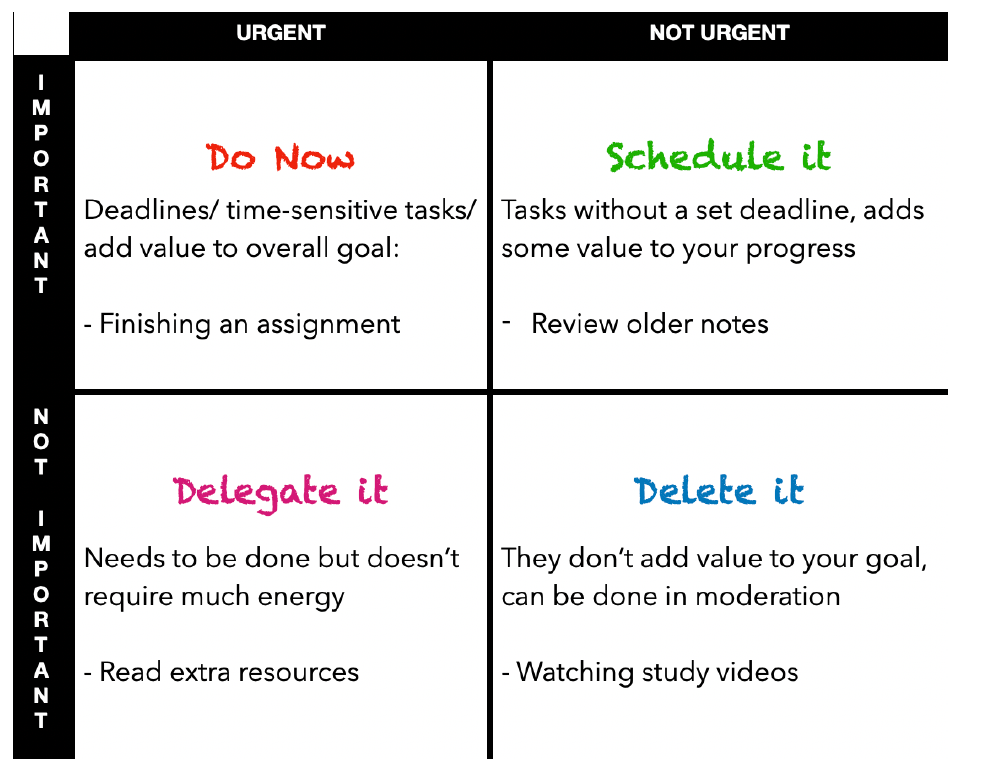
If you find yourself swamped with endless tasks and completing your bulk of assignments at 2am, then this may be exactly what you need. I used this framework when I was studying for my A level exams and it was ideal for my productivity.
American president Dwight D. Eisenhower was considered a man of many accomplishments and if you’ve studied about World War II, you may know a little about him. He was studied by many for his skills in task management, time management and productivity, Eisenhower once quoted a university professor saying, “I have two kinds of problems, the urgent and the important. The urgent are not important, and the important are never urgent.” This may be interpreted in a number of ways but I believe the quote implies that the urgent tasks are small but contribute to the main goals, which are the important tasks that take time and aren’t urgent.
Decades later, Stephen Covey wrote ‘The 7 Habits of Highly Effective People’, in which he cultivated the Eisenhower Matrix, also known as the Time Management Matrix. This principle helps prioritise every work/study-related task, sorting out the less urgent and important, to allow you more mental space and time.

STEP 1: Get it Down on Paper
The first thing you need to do is write every single task you need to do for your schoolwork or exam study. This will help clear your mind so blurt it all out on paper; from reorganising your notes to going over a new chapter.
STEP 2: Construct Your Matrix
Decide whether you want to have the matrix on paper or digitally. You can easily make a table in Pages or Microsoft word, this also allows you to make changes in the future.
STEP 3: Colour Code
Highlight all your important tasks; this will help you categorise your tasks according to the first criteria. The importance of a task may depend on where you are right now in your studies; for example, downloading and printing past papers is important for your exam practice but not when you’re in the middle of your semester.
STEP 4: Creating a Hierarchy
Now you have two lists; important and unimportant tasks. Taking the former list, mark up only the tasks that have to be done immediately or in the near future. For example, revising for next week’s assessment or researching for a paper due tomorrow. These highlighted and marked tasks now fall into the ‘Do Now’ category.
STEP 5: Schedule it
The tasks that are only highlighted (important but not urgent) fall into the ‘schedule it’ category. You can easily procrastinate on these things, for example, finishing writing notes for an older chapter or reviewing a graded assignment. However, they still add value to your studies so the best way to tackle them is to schedule them; perhaps in your weekly review day (post coming soon).
STEP 6: Delegate
What you are now left with is the tasks which are not highlighted, meaning they’re the least important. It’s time to decide which of these you cannot delete, for example, answering emails and correcting assignments. Therefore, the tasks which are less important but urgent should fall into ‘Delegate’ but, we’re students, we don’t have people working for us and we need to do most of our work ourselves. So how do we delegate? Well, one option is to ask a friend/parent/teacher to fill in and review your work and the other is to delegate it to your future self.
STEP 7: Delete it
Finally, you’re left with tasks which serve no purpose to your study routine, however, they usually take up a lot of your time and make you feel busy. Examples of these might be; deviating from your work, browsing the internet or social media or engaging in meaningless conversations during breaks. Some of these distractions can be indulged in with purpose but it’s best to eliminate them while you’re in your study period.
You’ve now created your own Eisenhower Matrix and you can easily plan and schedule your week according to this. Remember that urgent is not always important; urgent work requires your immediate attention and response while important work contributes to your overall goal. The strategy isn’t perfect but it does provide the framework you need, give it a try and see for yourself.
Thank you for reading, follow Loren for more productivity hacks.
This article is an excerpt from Loren’s ebook Becoming a Study Pro. Which you can get here: www.becomingastudypro.com
If you liked this article, let us know your thoughts in the comments!
You may also like:





